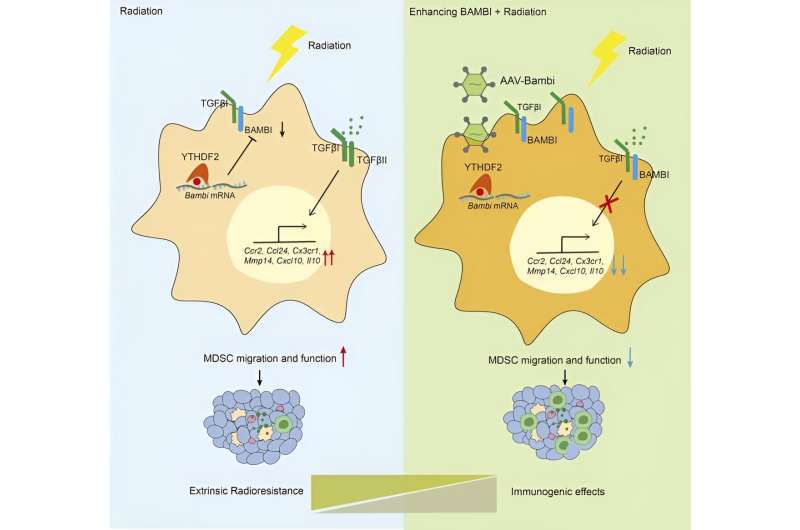This article has been reviewed according to Science X's editorial process and policies. Editors have highlighted the following attributes while ensuring the content's credibility:
fact-checked
peer-reviewed publication
trusted source
proofread
Novel therapeutic target overcomes resistance to radiation therapy

A new study finds that radiation therapy (RT) suppresses a key protein called bone morphogenetic protein and activin membrane-bound inhibitor (BAMBI) and activates immune suppressive cells. These effects dampen the capacity of cancer-fighting immune cells and decrease the effectiveness of radiation, inducing therapy resistance in cancer patients, according to a paper published December 15, 2023 in the Journal of Clinical Investigation.
Radiation therapy is a common cancer treatment that kills cancer cells and activates immune cells to fight cancer. Yet this process also recruits immunosuppressive cells like myeloid-derived suppressor cells (MDSCs), limiting the effectiveness of radiation therapy.
TGF-β in radiotherapy resistance
Researchers at the University of Chicago Medicine Comprehensive Cancer Center conducted a study to understand the mechanisms underlying MDSC-induced therapy resistance. MDSCs secrete a variety of immunosuppressors in response to RT. One such secreted protein, known as transforming growth factor-beta (TGF-β), plays a critical role in tumor progression. Thus, the researchers thought targeting TGF-β could be a therapeutically beneficial approach in radiation therapy-resistant patients.
"Although TGF-β is known to have an established role in immune suppression and migration of MDSCs, it is globally expressed. So, drugs that directly target TGF-β may induce unwanted side effects. Thus it is critical to understand the mechanisms that regulate the TGF-β signaling in MDSCs so we can target TGF-β indirectly and have better radiation treatment outcomes," said Ralph Weichselbaum, MD, Daniel K. Ludwig Distinguished Service Professor and Chair of Radiation and Cellular Oncology at UChicago Medicine.
Radiation reduces BAMBI levels
BAMBI is a mock receptor, or pseudoreceptor, that mimics the TGF-β receptor. It is known to suppress TGF-β signaling and is implicated in tumor suppression.
The research team, led by Liangliang Wang, Ph.D., a Research Assistant Professor in the Weichselbaum laboratory, analyzed the transcriptome data of cancer patients and found that patients with higher BAMBI expression showed prolonged overall survival in four tumor types: kidney renal clear cell carcinoma; kidney renal papillary cell carcinoma; pheochromocytoma and paraganglioma; and uterine corpus endometrial carcinoma.
Moreover, BAMBI was highly expressed in immune cells like monocytes and macrophages compared to other cell populations in melanoma and colorectal cancer patients.
BAMBI improves survival rate
"It is remarkable to see a significant reduction of BAMBI levels only in tumor-infiltrating MDSCs, not in other immune or tumor cell types following radiation treatment," said Weichselbaum. "We were interested in understanding the mechanism underlying the radiation-induced reduction of BAMBI levels in MDSCs."
Weichselbaum's team, in collaboration with Chuan He, Ph.D., the John T. Wilson Distinguished Service Professor of Chemistry at UChicago, previously published a study in Cancer Cell demonstrating increased levels of a protein known as YTH N6-methyladenosine RNA-binding protein F2 (YTHDF2) in MDSCs following radiation.
"In the current study, we were able to reproduce the similar kind of results in another cohort of patient samples. Moreover, we observed a close interaction between YTHDF2 and BAMBI in tumor-infiltrating immune cells, indicating YTHDF2 might be playing a critical role in regulating BAMBI's expression," said Weichselbaum.
The team conducted animal studies to test if overexpressing BAMBI in MDSCs could suppress the tumor infiltration of MDSCs in mice treated with radiation. As expected, viral delivery of BAMBI significantly reduced tumor growth and increased survival. Interestingly, BAMBI overexpression also further improved the outcomes of immunotherapy in the irradiated mice.
Many pharmacological interventions targeting TGF-β exist. Because many have toxic and non-specific effects, novel therapies like BAMBI—that indirectly target TGF-β and are restricted to immune suppressor cells—are especially promising, as they not only control local tumor growth but may also prevent the cancer from spreading.
The study, "Epitranscriptional regulation of TGF-β pseudoreceptor BAMBI by m6 A/YTHDF2 drives extrinsic radioresistance," was published in in Journal of Clinical Investigation on December 15, 2023.
More information: Liangliang Wang et al, Epitranscriptional regulation of TGF-β pseudoreceptor BAMBI by m6A/YTHDF2 drives extrinsic radioresistance, Journal of Clinical Investigation (2023). DOI: 10.1172/JCI172919



















